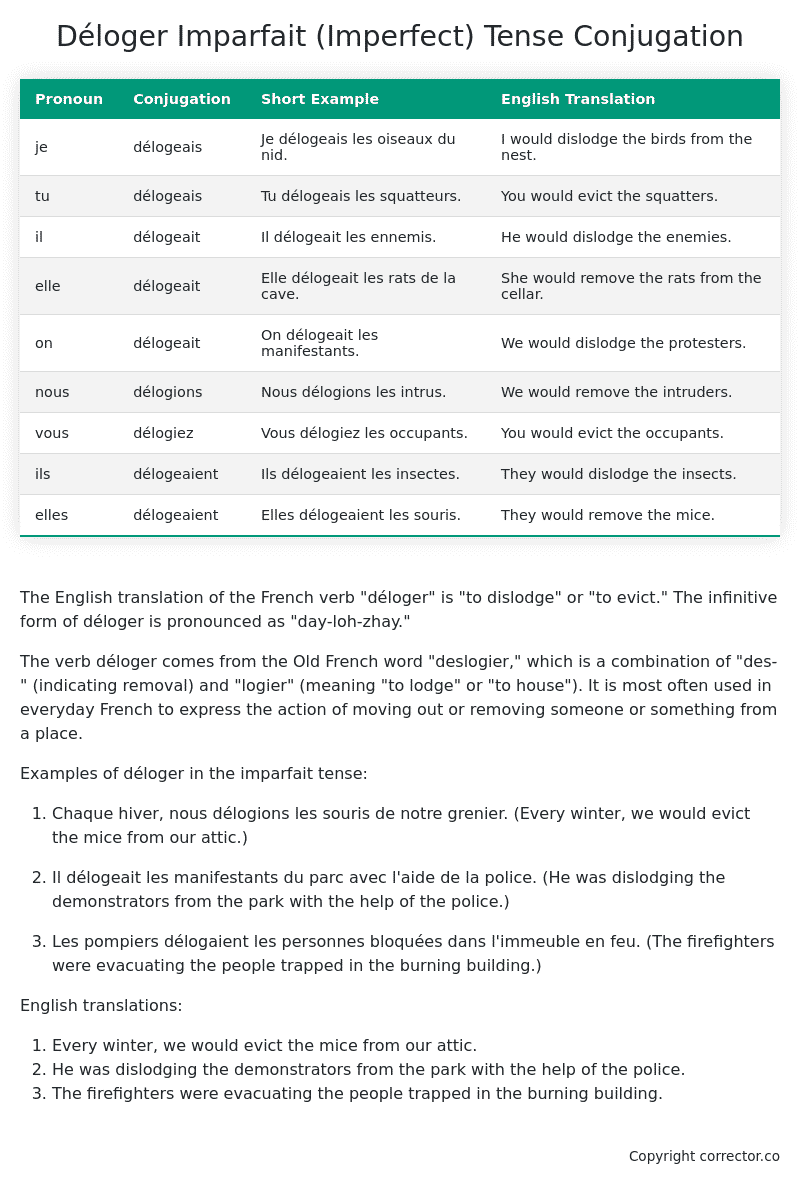Imparfait (Imperfect) Tense Conjugation of the French Verb déloger
Introduction to the verb déloger
The English translation of the French verb “déloger” is “to dislodge” or “to evict.” The infinitive form of déloger is pronounced as “day-loh-zhay.”
The verb déloger comes from the Old French word “deslogier,” which is a combination of “des-” (indicating removal) and “logier” (meaning “to lodge” or “to house”). It is most often used in everyday French to express the action of moving out or removing someone or something from a place.
Examples of déloger in the imparfait tense:
-
Chaque hiver, nous délogions les souris de notre grenier.
(Every winter, we would evict the mice from our attic.) -
Il délogeait les manifestants du parc avec l’aide de la police.
(He was dislodging the demonstrators from the park with the help of the police.) -
Les pompiers délogaient les personnes bloquées dans l’immeuble en feu.
(The firefighters were evacuating the people trapped in the burning building.)
English translations:
- Every winter, we would evict the mice from our attic.
- He was dislodging the demonstrators from the park with the help of the police.
- The firefighters were evacuating the people trapped in the burning building.
Table of the Imparfait (Imperfect) Tense Conjugation of déloger
| Pronoun | Conjugation | Short Example | English Translation |
|---|---|---|---|
| je | délogeais | Je délogeais les oiseaux du nid. | I would dislodge the birds from the nest. |
| tu | délogeais | Tu délogeais les squatteurs. | You would evict the squatters. |
| il | délogeait | Il délogeait les ennemis. | He would dislodge the enemies. |
| elle | délogeait | Elle délogeait les rats de la cave. | She would remove the rats from the cellar. |
| on | délogeait | On délogeait les manifestants. | We would dislodge the protesters. |
| nous | délogions | Nous délogions les intrus. | We would remove the intruders. |
| vous | délogiez | Vous délogiez les occupants. | You would evict the occupants. |
| ils | délogeaient | Ils délogeaient les insectes. | They would dislodge the insects. |
| elles | délogeaient | Elles délogeaient les souris. | They would remove the mice. |
Other Conjugations for Déloger.
Le Present (Present Tense) Conjugation of the French Verb déloger
Imparfait (Imperfect) Tense Conjugation of the French Verb déloger (You’re reading it right now!)
Passé Simple (Simple Past) Tense Conjugation of the French Verb déloger
Passé Composé (Present Perfect) Tense Conjugation of the French Verb déloger
Futur Simple (Simple Future) Tense Conjugation of the French Verb déloger
Futur Proche (Near Future) Tense Conjugation of the French Verb déloger
Plus-que-parfait (Pluperfect) Tense Conjugation of the French Verb déloger
Passé Antérieur (Past Anterior) Tense Conjugation of the French Verb déloger
Futur Antérieur (Future Anterior) Tense Conjugation of the French Verb déloger
Subjonctif Présent (Subjunctive Present) Tense Conjugation of the French Verb déloger
Subjonctif Passé (Subjunctive Past) Tense Conjugation of the French Verb déloger
Subjonctif Imparfait (Subjunctive Imperfect) Tense Conjugation of the French Verb déloger
Subjonctif Plus-que-parfait (Subjunctive Pluperfect) Tense Conjugation of the French Verb déloger
Conditionnel Présent (Conditional Present) Tense Conjugation of the French Verb déloger
Conditionnel Passé (Conditional Past) Tense Conjugation of the French Verb déloger
Conditionnel Passé II (Conditional Past II) Tense Conjugation of the French Verb déloger
L’impératif Présent (Imperative Present) Tense Conjugation of the French Verb déloger
L’impératif Passé (Imperative Past) Tense Conjugation of the French Verb déloger
L’infinitif Présent (Infinitive Present) Tense Conjugation of the French Verb déloger
L’infinitif Passé (Infinitive Past) Tense Conjugation of the French Verb déloger
Le Participe Présent (Present Participle) Tense Conjugation of the French Verb déloger
Le Participe Passé (Past Participle) Tense Conjugation of the French Verb déloger
Struggling with French verbs or the language in general? Why not use our free French Grammar Checker – no registration required!
Get a FREE Download Study Sheet of this Conjugation 🔥
Simply right click the image below, click “save image” and get your free reference for the déloger imparfait tense conjugation!

Déloger – About the French Imparfait Tense
NOTE: To take a deep dive into all the French tenses then see our article on Mastering French Tense Conjugation.
Formation of the Imparfait Tense
For regular -er verbs:
For regular -ir verbs
For regular -re verbs
Common Everyday Usage Patterns
Description of Past Habits
Background Information
Mental and Emotional States
It’s employed to express emotions, thoughts, or physical sensations in the past. For example: “J’étais content quand il est arrivé.” (I was happy when he arrived.)
Ongoing Actions
Points to Note About the Imparfait Tense
Passé Composé vs. Imparfait
Conditional
Si Clauses
Narration
I hope you enjoyed this article on the verb déloger. Still in a learning mood? Check out another TOTALLY random French verb imparfait conjugation!


